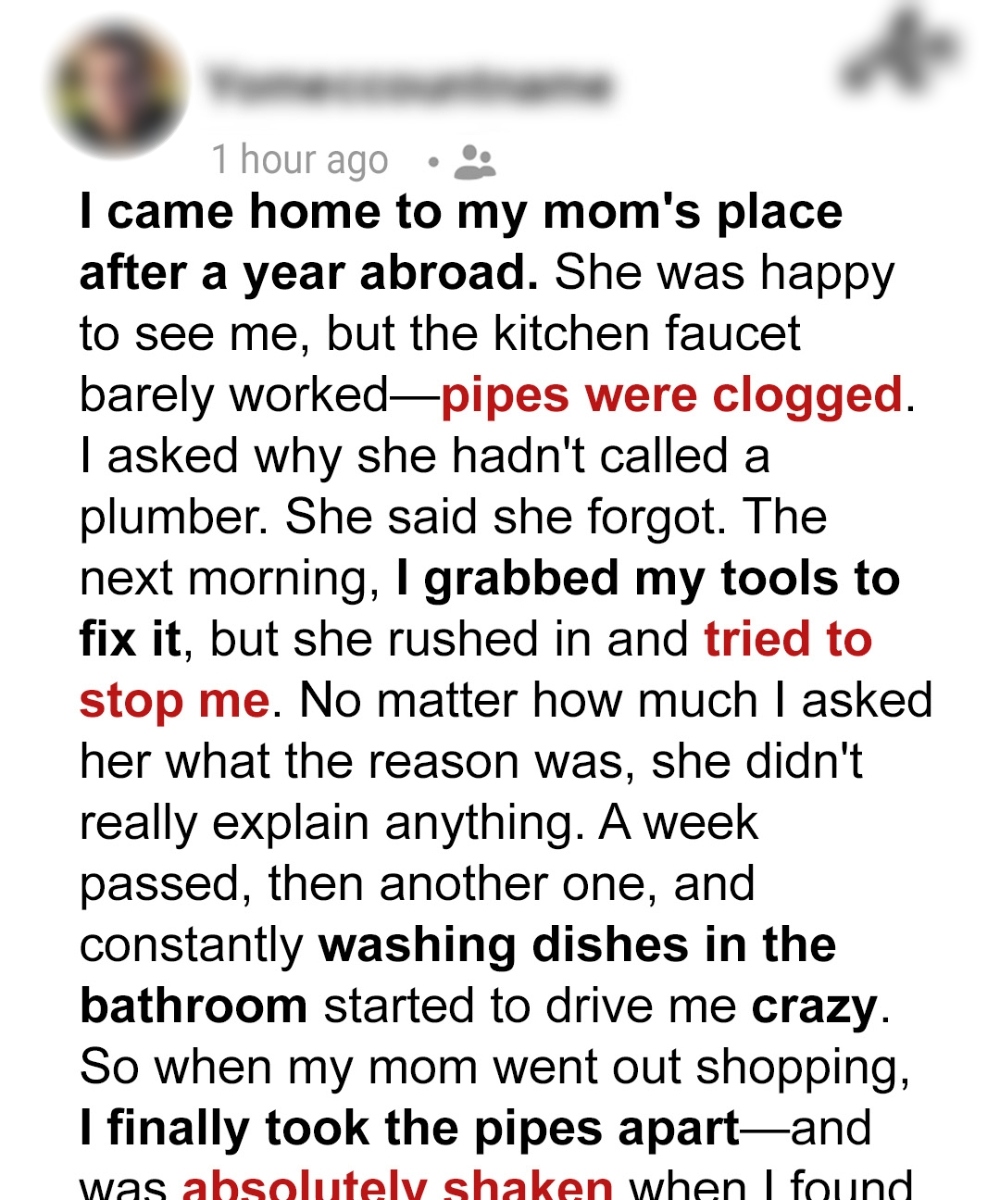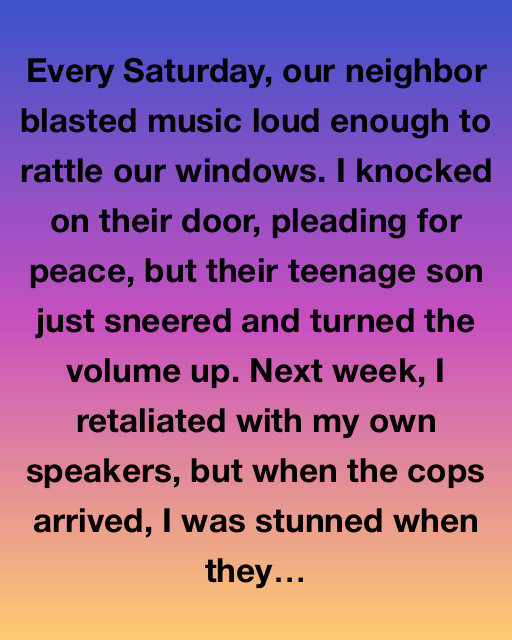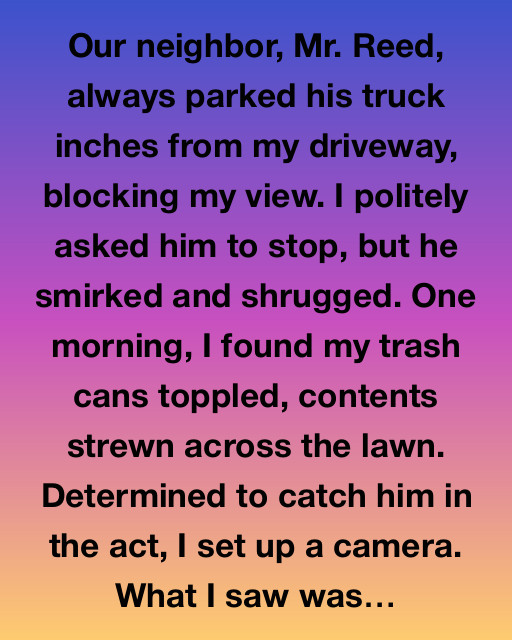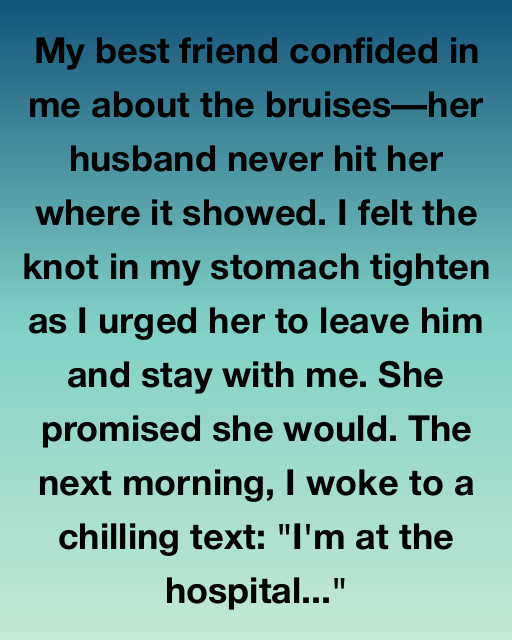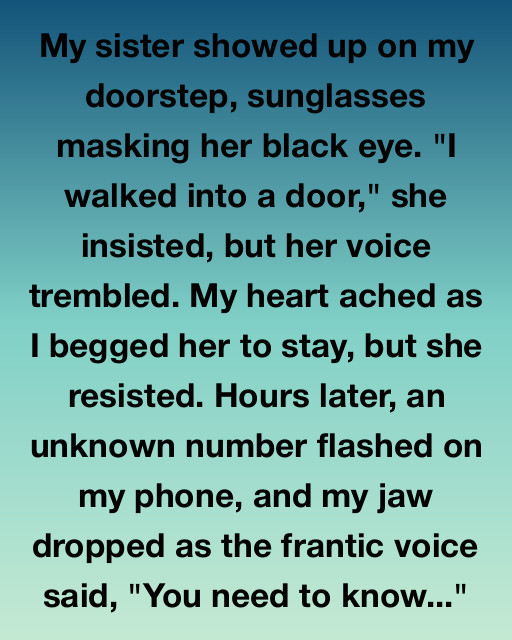I came home to my mom’s place after a year abroad. She was happy to see me, but the kitchen faucet barely worked—pipes were clogged. I asked why she hadn’t called a plumber. She said she forgot. The next morning, I grabbed my tools to fix it, but she rushed in and tried to stop me. No matter how much I asked her what the reason was, she didn’t really explain anything. A week passed, then another one, and constantly washing dishes in the bathroom started to drive me crazy. So when my mom went out shopping, I finally took the pipes apart—and was absolutely shaken when I found a thick, dirty-looking envelope wedged inside the U-bend.
My hands trembled as I pulled it free. The envelope was covered in a slimy film, but I could see a rubber band holding it together. I took it to the kitchen table, pried it open, and found stacks of hundred-dollar bills inside—way more money than I’d seen in one place in my life. My first thought was that maybe Mom had been hiding it for emergencies. But when she came home and saw the disassembled sink, her eyes went wide, then narrowed. I told her about the envelope, and she looked like she might faint.
She sat down slowly, staring at the floor. I kept asking where the money came from. After a long silence, she admitted it wasn’t hers. She said she’d found it hidden in the pipes about two years ago, right after the previous owner of the house—Mr. Garrick, an older man who’d lived alone—passed away. She’d panicked, thinking maybe it was drug money or something illegal, and stuffed it back into the pipe, hoping if she ignored it, it would just go away. I didn’t know what to say. Part of me thought we should just keep it—no one seemed to be looking for it. But the other part of me felt like it was wrong.
Over the next few days, I tried to talk to Mom about it, but she kept shutting me down. She was terrified someone might still come looking. I did some research and found out Mr. Garrick had no close family. He’d lived quietly, but there were rumors in the neighborhood that he’d been a loan shark back in the day. My curiosity grew, and I started asking neighbors what they remembered. One woman, Mrs. Yancey, told me she’d once overheard Garrick threatening a man on his front porch over some unpaid debt.
That night, lying awake, I thought about what the money could do for us. Mom’s pension barely covered her bills, and the house was falling apart. But the idea of spending dirty money made my stomach turn. When I brought it up again, Mom broke down in tears. She confessed that the reason she hadn’t fixed the faucet all this time was because she couldn’t bring herself to touch the pipes. Every time she tried to call someone, fear would paralyze her. She’d start thinking that if someone ever found out she had the cash, we’d be in danger.
I decided to take matters into my own hands. I called an attorney I knew from college, a guy named Rourke, who now specialized in estate issues. Without telling Mom, I asked him what we should do if we found a large sum of unclaimed money belonging to a deceased person. He told me it depended on the circumstances but said the safest route would be to turn it over to the authorities or the executor of Garrick’s estate—if one existed.
A few days later, Rourke called back saying there was no executor. Garrick’s estate had been wrapped up by the bank after defaulted property taxes, which meant technically, anything he left behind should’ve gone to the state. I thanked him and hung up, but my mind was racing. If we kept it, there was a chance we’d never get caught. But if we turned it in, we’d have to explain everything, and Mom could get into legal trouble for hiding it so long.
Then came the twist I never saw coming. A man showed up at the door. He looked to be in his early sixties, wearing an old denim jacket. He introduced himself as Silas, said he was Garrick’s nephew, and claimed he’d just found some old letters from his uncle mentioning money hidden in the house. My heart nearly stopped. Mom went pale. Silas asked if we’d seen anything unusual. I lied and said we hadn’t, but he didn’t seem convinced. He hung around for an uncomfortably long time, glancing around the kitchen. Finally, he left, but I saw him park his truck down the street, just sitting there.
I realized we couldn’t stay silent. I told Mom we had to end this once and for all. That night, I gathered the envelope, wiped it clean, and told her we were going to the police first thing in the morning. She was terrified Silas might follow us, but I promised to keep her safe. The next morning, I peeked outside and didn’t see his truck, so we left quickly. At the station, I explained everything to the officer on duty. He seemed surprised but thanked us for coming forward.
They took the money and opened an investigation. A detective followed up, asking for details about when and how Mom found the cash. I was scared they’d arrest her, but after a few tense weeks, they told us we wouldn’t be facing charges because she hadn’t actually spent any of the money. They said Silas had no legal claim since Garrick never listed him as an heir. Turns out, Silas wasn’t even really a nephew—he was an old associate who’d loaned Garrick money decades earlier.
The police said he’d been trying to track down what he thought Garrick owed him, but he had no right to the cash. They kept it as unclaimed property and said if no rightful heir emerged within a year, it would go to the state’s unclaimed funds program. Knowing that, I felt an odd mix of relief and sadness. We could’ve used that money so badly. Mom’s relief was more obvious—she started sleeping again, and I saw her smile for the first time since I came home.
A few weeks after all this, we got a letter from a local charity. Apparently, the police had forwarded our case, and a foundation offered to help elderly homeowners with urgent repairs as a gesture of goodwill. They sent a crew over to fix the faucet, replace old wiring, and patch up the roof—all at no cost to us. I couldn’t believe it. It felt like karma was rewarding us for trying to do the right thing.
Life slowly returned to normal. Mom started baking again, and I helped her plant new flowers in the garden. Every time I heard the faucet running smoothly, I felt grateful. We might not have walked away with a windfall, but we gained peace of mind and a safer home. Looking back, I realized the real lesson wasn’t about the money at all—it was about facing problems head-on instead of letting fear control you.
If we’d kept hiding or tried to spend the cash, we’d always be looking over our shoulders. By being honest, we found a way forward. And sometimes, that’s worth more than any amount of money. If you’ve ever been in a tough spot like this, don’t let fear stop you from doing what’s right. You never know how life—or even strangers—might surprise you with kindness once you take that first honest step.
If this story touched you, please share it with your friends and like this post to spread the message. Let’s remind each other that doing the right thing always matters, even when it’s hard.
